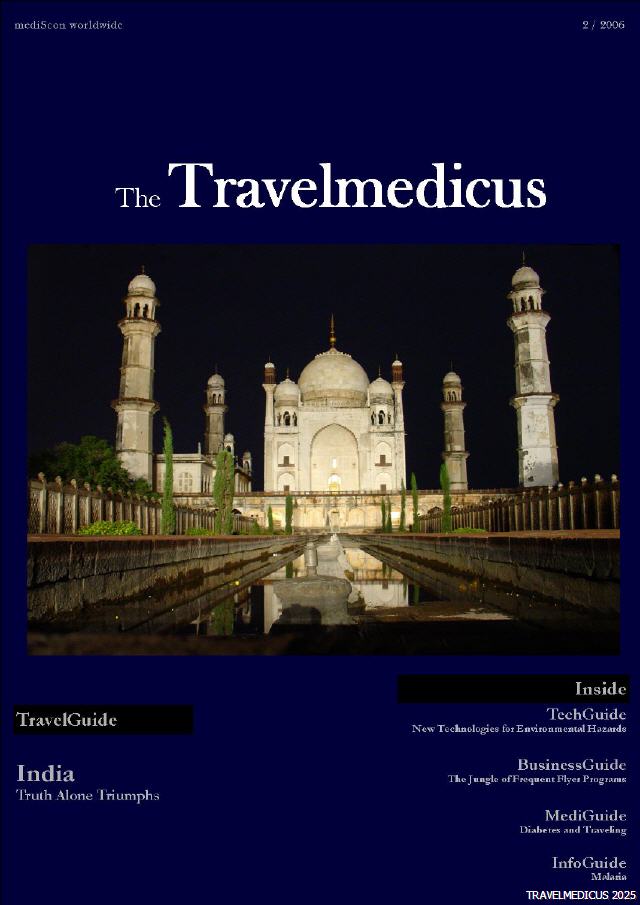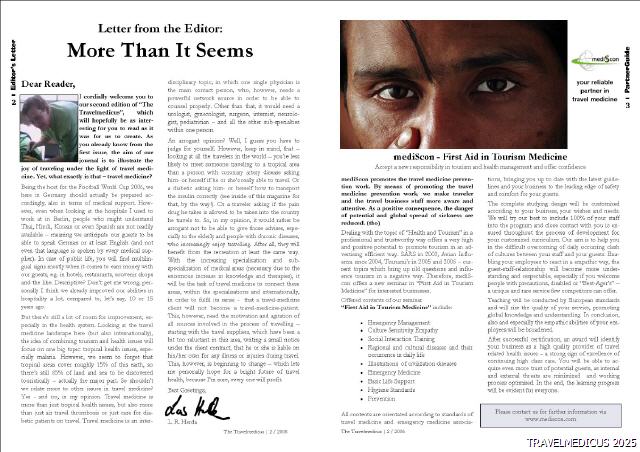Ausgabe 2/2006
Dear Reader,

trying to come to India at least once a year I congratulate the Editors for choosing India a main topic of the second Travelmedicus issue. India is fascinating with its many cultural aspects and treasures, religions, different climates and its vibrating daily life.
Yet, India is still not so much a destination for the average tourist, but rather for the “adventure-seeker”. Why is this so? I believe there are two main reasons, both related to health issues.
Tourists are afraid to get sick in India. When I go to a restaurant that is not first class or in an excellent Hotel in India, I usually do not touch any salad or any cold, pre-prepared food. I only drink bottled water and only eat fruits that I have to peel before eating. If I don´t, chances are high to get massive diarrhea – my western intestines do not have the immunity to fight off all the bugs I might acquire if I would not be so careful or that I remember having acquired several times when I tried anyway.
The other fear is to have to see a doctor or to become hospitalized in India. This fear is partly correct, partly unfair. India has excellent doctors and many doctors educated in Indian Universities make outstanding careers in countries around the globe. While some Hospitals in India – e.g., Privat Hospital or Hospitals of the Apollo Group - are excellent in any aspect and charge only a fraction of the price that one would have to pay in other countries for the same treatment – most are still not suited for the western patient. The main problem again: hygiene. I have visited at least 20 hospitals during the last few years in India. In most of them, including University Hospitals, I would be very afraid to be a patient, since I am not used to unclean walls, floors etc. Awareness of such aspects is the first step to resolving these problems.
The Travelmedicus focuses on globally educating personnel dealing with tourists in health aspects. I am fascinated about this approach, since it focuses on a central problem left out usually in tourism: Educating the people concerned with tourists about expectations and needs of tourists, business travellers and expatriates in health matters.
Other important topics of the Travelmedicus are articles on specific diseases like the article on Diabetes mellitus in the present issue. Elderly people and people with chronic diseases travel much more frequently – and awareness of their needs is important.
A few years ago I was invited for dinner in France. Being invited at 8 p.m. and coming, as we are used to do in Germany, around 8.15, I wondered why the hosts were not ready for me at all. Now I know – the culture guide on France in the last issue of Travelmedicus explained: I was insultingly early, since being invited at 8 apparently means to show up around 9 in France. I am looking forward to other mistakes I have made in other countries! Thank you, Travelmedicus, for hopefully saving me from more such mistakes in the future.
I have been fascinated reading the first issue of “The Travelmedicus” and look forward to the present one. I wish this journal high success and know the journal will contribute to improvements of health care matters worldwide and thus not only have direct impact on the readership, but increase attractiveness of fascinating countries for the international traveller.
Sincerely yours
Prof. Dr. Rupert Gerzer
German Association for Travel Medicine
Letter from the Editor

Dear Reader,
I cordially welcome you to our second edition of “The Travelmedicus”, which will hopefully be as interesting for you to read as it was for us to create. As you already know from the first issue, the aim of our journal is to illustrate the joy of traveling under the light of travel medicine.
Yet, what exactly is that – travel medicine?
Being the host for the Football World Cup 2006, we here in Germany should actually be prepared accordingly, also in terms of medical support. However, even when looking at the hospitals I used to work at in Berlin, people who might understand Thai, Hindi, Korean or even Spanish are not readily available – meaning we anticipate our guests to be able to speak German or at least English (and not even that language is spoken by every medical supplier).
In case of public life, you will find multilingual signs mostly when it comes to earn money with our guests, e.g. in hotels, restaurants, souvenir shops and the like. Descriptive? Don’t get me wrong, personally I think we already improved our abilities in hospitality a lot, compared to, let’s say, 10 or 15 years ago.
But there’s still a lot of room for improvement, especially in the health system. Looking at the travel medicine landscape here (but also internationally), the idea of combining tourism and health issues will focus on one big topic: tropical health issues, especially malaria. However, we seem to forget that tropical areas cover roughly 15% of this earth, so there’s still 85% of land and sea to be discovered touristically – actually the major part. So shouldn’t we relate more to other issues in travel medicine?
Yes - and no, in my opinion. Travel medicine is more than just tropical health issues, but also more than just air travel thrombosis or just care for diabetic patients on travel. Travel medicine is an interdisciplinary topic, in which one single physician is the main contact person, who, however, needs a powerful network source in order to be able to counsel properly. Other than that, it would need a urologist, gynecologist, surgeon, internist, neurologist, pediatrician – and all the other sub-specialties within one person.
An arrogant opinion? Well, I guess you have to judge for yourself. However, keep in mind, that – looking at all the travelers in the world – you’re less likely to meet someone traveling to a tropical area than a person with coronary artery disease asking him- or herself if he or she’s really able to travel. Or a diabetic asking him- or herself how to transport the insulin correctly (see inside of this magazine for that, by the way!). Or a traveler asking if the pain drug he takes is allowed to be taken into the country he travels to. So, in my opinion, it would rather be arrogant not to be able to give those advises, especially to the elderly and people with chronic diseases, who increasingly enjoy travelling. After all, they will benefit from the recreation at least the same way.
With the increasing specialisation and subspecialization of medical areas (necessary due to the enormous increase in knowledge and therapies), it will be the task of travel medicine to connect these areas, within the specialisations and internationally, in order to fulfil its sense - that a travel-medicine client will not become a travel-medicine-patient.
This, however, need the motivation and agitation of all sources involved in the process of travelling – starting with the travel suppliers, which have been a bit too reluctant in this area, writing a small notice under the client contract, that he or she is liable on his/her own for any illness or injuries during travel.
This, however, is beginning to change – which lets me personally hope for a bright future of travel health, because I’m sure, every one will profit.
Best Greetings,
L. R. Herda